- Home
- Michael Dobbs
To play the king fu-2 Page 2
To play the king fu-2 Read online
Page 2
'I prefer to cut through it rather than spread it. And I can play your game.' She sat back into the sofa and began counting off the carefully manicured fingers of her left hand. 'Ben Landless. Age… well, for your well-known vanity's sake, let's say not quite menopausal. A rough son-of-a-bitch who was born to nothing and now controls one of the largest press operations in this country.' 'Soon to be the largest,' he interrupted quietly.
'Soon to take over United Newspapers,' she nodded, 'when the Prime Minister you nominated, backed and got elected virtually single-handed takes over in a couple of hours' time and waves aside the minor inconvenience of his predecessor's mergers and monopolies policy. You must've been celebrating all night, I'm surprised you had the appetite for breakfast. But you have the reputation of being a man with insatiable appetites. Of all kinds. So what's on your mind, Ben?' She spoke almost seductively in an accent that had been smoothed and carefully softened but not obliterated. She wanted people to take notice and to remember, to pick her out from the crowd. So the vowels were still New England, a shade too long and lazy for London, and the sentiments often rough as if they had been fashioned straight from the dole queues of Dorchester.
A smile played around the publisher's rubbery lips as he contemplated his good fortune and her defiance, but his eyes remained unmoved, watching her closely. His humour seemed confined to the lower half of his face, not touching his eyes nor penetrating beneath the skin. There is no deal. I backed him because I thought he was the best man for the job, but there's no private pay-off. I shall take my chances, just like all the rest.'
She suspected that was the second lie of the conversation, but let it pass.
'Whatever else happens, it's a new era. A change of Prime Minister means fresh challenges. And opportunities. I suspect he'll be more relaxed about getting the wheels of business turning and letting people make money than was Henry Collingridge. That's good news for me. And potentially for you.' 'With all the economic indicators scooting downhill?'
'That's just the point. Your opinion-research company has been in business for… what, twenty months? You've made a good start, you're well respected. But you're small, and small boats like yours could be swamped if the economy gets rough over the next couple of years. Anyway, you've no more patience than I do in running a shoestring operation. You want to make it big, to be on top. And for that you need cash.'
'Not your cash. If I had newspaper money poured into my operation it would ruin every shred of credibility I've built. My business is supposed to be objective analysis, not smears and scares with a few naked starlets thrown in to boost circulation.'
He ran his thick tongue around his mouth as if trying absent-mindedly to dislodge a piece of breakfast. 'You underestimate yourself,' he muttered. He produced a toothpick, which he used like a sword-swallower to probe into a far corner of his jaw. 'Opinion polls are not objective analysis. They're news. If an editor wants to get an issue rolling he commissions people like you to carry out some research. He knows what answers he wants and what headline he's going to run, he just needs a few statistics to give the whole thing the smack of authenticity. Opinion polls are the weapons of civil war. Kill off a government, show the nation's morals are shot to hell, establish that we all love Palestinians or hate apple pie. You don't need facts, just the blessing of an opinion poll.'
He grew more animated as he warmed to his theme. His hands had come down from his mouth and were grasped in front of him as if throttling an incompetent editor. There was no sign of the toothpick; perhaps he had simply swallowed it, as he did most things which got in his way.
'Information is power,' he continued. 'And money. A lot of your work is done in the City, for instance, with companies involved in takeover bids. Your little polls tell them how shareholders and the financial institutions might react, whether they'll be supportive or simply dump the company for a bit of quick cash. You can discover how opinion is running amongst the analysts and financial journalists, not over some wine-sodden lunch at the Savoy Grill with a company chairman but back at their desks, where it matters. Takeover bids are wars, life or death for the companies concerned, and your job is to tell them whose guts are most likely to be spread over the floor at the end of the day. That information has great value.' 'And we charge a very good fee for such work.'
'I'm not talking thousands or tens of thousands,' he barked dismissively. 'That's petty cash in the City. The sort of information we're talking about allows you to name your own figure, if you make it work for you.' He paused to see if there would be a squawk of impugned professional integrity; instead she reached behind her to pull down her jacket, which had ridden up against the back of the sofa. As she did so she exposed and accentuated the rounded curves at the top of her breasts. He took it as a sign of encouragement.
'You need money. To expand. To grab the polling industry by the balls and to become its undisputed queen. Otherwise you go belly-up in the recession. Be a great waste.' 'I'm flattered by your avuncular interest.'
'You're not here to be flattered. You're here to listen to a proposition.'
'I've known that from the moment I got your invitation. Although for a moment there I thought we'd wound up on the lecture circuit.'
Instead of responding he levered himself out of his chair and crossed to the window. The gun-grey clouds had descended still lower and it had begun to rain. A barge was battling to make headway through the ebbing tide beneath Westminster Bridge where the December winds had turned the usually tranquil river into a muddy, ill-tempered soup of urban debris and bilge oil. He gazed in the direction of the Houses of Parliament, his hands stuffed firmly into the folds of his tent-like trousers, scratching himself.
'Our leaders over there, the fearless guardians of the nation's welfare. Government is necessarily a secretive business, full of shared confidences, of information which is restricted because its public release would be sensationalized or abused. And every single one of those bastards would leak the lot if it served their purposes. There's not a political editor in town who doesn't know every word of what's gone on within an hour of a Cabinet meeting finishing, nor a general who hasn't leaked a confidential report about the nation's security before doing battle with the Treasury over the defence budget. And you find me the politician who hasn't tried to undermine a rival by starting gossip about his sex life.' His hands flapped in his trouser pockets like the sails of a great ship trying to catch the wind. 'Prime Ministers are the worst,' he snorted contemptuously. 'If they want to rid themselves of a troublesome Minister, they'll assassinate him in the press beforehand with tales of drunkenness or disloyalty. Inside information. It's what makes the world go round. And it's not a matter to our masters of if you use it, but when.' 'Perhaps that's why I never went into politics,' she mused.
He turned towards her, to discover her seemingly engrossed in removing a stray hair from her sweater. When she was sure she had his full attention she stopped toying with him and hid once again inside the folds of her jacket. 'So what is it you are going to suggest I do?'
Once again his tongue rolled distractedly around his mouth, this time in search not of the elusive piece of breakfast but of inspiration and the appropriate words. He sat down beside her on the sofa and the proximity of his shirt-clad bulk squeezed any suggestion of levity from the air. His physical presence was, surprisingly to her fashion-conscious eye, indeed impressive.
'I'm going to suggest you stop being an also-ran, a woman who may strive for years to make it to the top yet never succeed. I'm suggesting a partnership. With me. Your expertise' – they both knew he meant inside information – 'backed by my financial clout. It would be a formidable combination.' 'But what's in it for me?'
'A guarantee of survival. A chance to make a lot of money, to get where you want to go, to the top of the pile. To show your former husband that not only can you survive without him but even succeed. That's what you want, isn't it?' 'And how is all this supposed to happen?'
'We pool our resour
ces. Your information and my money. If there's any action going on in the City I want to be part of it. Get in there ahead of the pack and the potential rewards are huge. You and I split any profit right down the middle.'
She brought her forefinger and thumb together in front of her face. Her nose offered an emphatic bob. 'Excuse me, but if I understand you right, isn't that just the tiniest bit illegal?' He responded with silence and a look of unquenchable boredom.
'And it sounds as if you would be taking all the risk,' she continued.
'Risk is a fact of life. I don't mind taking the risk with a partner I know and trust. I'm sure we could get to trust each other very closely; it would be vital.'
He reached out and brushed the back of her hand; there was no mistaking the glaze of distrust which flashed into her eyes.
'Before you ask, getting you into bed is not an essential part of the deal – no, don't look so damned innocent and offended. You've been flashing your tits at me from the moment you sat down so let us, as you say, cut through it all and get down to basics. Getting you on your back would be a pleasure, but this is business and in my book business comes first. I've no intention of cocking up what could be a first-class deal by letting my brains slip between my legs. You've got a body which I've no doubt you know how and when to use, but I can buy all the beauty and bum I want at very much less of a price than potentially I'm offering you. We're here to screw the competition, not each other. So… what's it to be? Are you interested?'
As if on cue a phone began to warble in a distant part of the room. With a grunt of exasperation he levered himself up, but as he crossed the room to answer the call there was also anticipation; his office had the strictest instruction not to bother him unless… He barked briefly into the phone before returning to his guest, his hands spread wide as though approaching a table laden with fine food.
'Extraordinary. My cup runs over. That was a message from Downing Street. Apparently our new Prime Minister wishes me to call on him as soon as he's back from the Palace, so I'm afraid I must rush off. Wouldn't do to keep him waiting.' His candle-wax face was contorted in what passed for a grin. She would be the focus of his attention for only a few moments longer: another place, another partner beckoned. He was already climbing into his coat. 'So make it a very special day for me. Accept.'
She stretched for her handbag on the sofa but he was there also, his huge labourer's hand completely encasing her own. They were very close and she could feel the heat from his body, smell him, sense the power beneath the bulk which was capable of crushing her instantly if he so chose. But there was no threat in his manner, his touch was surprisingly gentle. For a moment she caught herself feeling disarmed, almost aroused. Her nose twitched.
'You go sort out the nation's balance of payments. I'll think about mine.' 'Think carefully, Sally, and not too long.' 'I'll consult my horoscope. I'll be in touch.'
At that moment the seagull made another screeching attack, hurling insults as it pounded against the window, leaving it dripping with guano. He cursed. 'It's supposed to be a lucky omen,' she laughed lightly.
'Lucky?' he growled as he led her out of the door. 'Tell that to the bloody window cleaner!'
It hadn't been as he had expected. The crowds had been much thinner than in years gone by; indeed, fewer than two dozen people standing outside the Palace gates, skulking tortoise-like beneath umbrellas and plastic raincoats, could scarcely be counted as a crowd at all. Perhaps it was the approach of Christmas and the foul weather which had kept them away. Maybe the great British public simply didn't give a damn anymore who their Prime Minister was.
He sat back in the car, a man of bearing and distinction amidst the leather, his tired smile implying a casual, almost reluctant acceptance of his lot. He had a long face which led from a high and distinguished forehead to thin lips, the skin ageing but still taut beneath the chin, austere like a Roman bust with lank silver-sandy hair carefully combed away from the face. He was dressed in his habitual charcoal-grey suit with two buttons and a brightly coloured, almost foppish silk handkerchief which erupted out of the breast pocket, an affectation he had adopted to distance himself from the Westminster hordes in their banal Christmas-stocking tics and Marks amp; Spencer suits. Every few seconds he would bend low, stretching down behind the seat to suck at the cigarette he kept hidden below the window line, the only outward show of the tension and excitement which bubbled within. He took a deep lungful of nicotine and for a while didn't move, feeling his throat go dry as he waited for his heart to slow, pondering, only the small blue eyes moving sharply, never resting. They seemed perpetually strained, agitated, slightly damp and raw at the rims as if they had spent too long poring late into the night over official papers. The eyes attracted many women, stimulating their protective maternal instincts, while in men they aroused only anxiety. They suggested tension, an impatience, a man quick to ire and slow to forget.
The Right Honourable Francis Ewan Urquhart, MP, since six o'clock the previous evening the leader of his party and within minutes to be asked to accept the leadership of a new government, gave a perfunctory wave to the huddled group of onlookers from the rear seat of his new ministerial Jaguar as it passed into the forecourt of Buckingham Palace. His wife had wanted to lower the window in order for the assorted cameramen lurking nearby to obtain a better view of them both, but discovered that the windows on the official car were more than an inch thick and cemented in place. She had been assured by the driver that nothing less than a direct hit from a mortar with armour-piercing shells would open them.
The last few hours had seemed all but comic. After the result of the leadership ballot had been announced and with victory confirmed, he had rushed back to his house in Cambridge Street and waited with his wife. For what, they hadn't quite known. What was he supposed to do now? There had been no one to tell him. He had waited beside the phone but it stubbornly refused to ring. He'd rather expected a call of congratulation from some of his parliamentary colleagues, perhaps from the President of the United States or at the very least his sister, but already the new caution of his colleagues towards a man formerly their equal and now their master was beginning to exert itself; the President wouldn't call until he'd been confirmed as Prime Minister and his sister apparently thought his telephone would be permanently engaged for days. In desperation for someone with whom to share their joy they took to posing for photo-calls at the front door and chatting with the journalists assembled on the pavement outside.
He was not naturally gregarious, a childhood spent roaming alone with no more than a dog and a satchelful of books across the heathers of the family estates in Scotland had attuned him well to his own company, but it was never enough. He needed others, not simply to mix with but against whom to measure himself. It was what had driven him South, that and the financial despair of the Scottish moorlands. A grandfather who had died with no thought of how to avoid the venality of the Exchequer; a father whose painful sentimentality and attachment towards tradition had brought the estate's finances to their knees. He had watched his parents' fortunes and their social position wither like apple blossom in snow. Urquhart had got out while there was still something to extract from the heavily mortgaged moors, ignoring his father's entreaties on family honour which in despair had turned to tearful denunciation. It had been scarcely better at Oxford. His childhood companionship with books had led to a brilliant academic career and to a readership in Economics, but he had not taken to the life. He had grown to despise the crumpled corduroy uniforms and fuzzy moralizing which so many of his colleagues seemed to dress and die in, and found himself losing patience with the dank river mists which swept off the Cherwell and the petty political posturings of the dons' dinner table. One evening the Senior Common Room had indulged in mass intellectual orgasm as they had flayed a junior Treasury Minister within an inch of his composure; for most of those present it had merely confirmed their views of the inadequacies of Westminster, for Urquhart it had reeked only of the opport
unities. So he had turned his back on both the teeming moors and dreaming spires and had risen fast, while taking great care all the while to preserve his reputation as an academic. It made other men feel inferior, and in politics that was half the game.
It was only after his second photo-call, about eight thirty p.m., that the telephone jumped back to life. A call from the Palace, the Private Secretary. Would he find it convenient to come by at about nine tomorrow morning? Yes, he would find that most convenient, thank you. Then the other calls began to flow in. Parliamentary colleagues unable any longer to control their anxieties about what job he might in the morning either offer to or strip from them. Newspaper editors uncertain whether to fawn or threaten their way to that exclusive first interview they all wanted. Solicitous mandarins of the civil service anxious to leave none of the administrative details to chance. The chairman of the party's advertising agency who had been drinking and couldn't stop gushing. And Ben Landless. There had been no real conversation, simply coarse laughter down the phone line and the unmistakable sound of a champagne cork popping. Urquhart thought he might have heard at least one woman giggling in the background. Landless was celebrating, as he had every right to. He had been Urquhart's first and most forthright supporter, and between them they had manoeuvred, twisted and tormented Henry Collingridge into premature retirement. Urquhart owed him, more than he could measure, while characteristically the newspaper proprietor had not been coy in identifying an appropriate yardstick.
He was still thinking about Landless as the Jaguar shot the right-hand arch at the front of the Palace and pulled into the central courtyard. The driver applied the brakes cautiously, aware not only of his regal surroundings but also of the fact that you cannot stop more than four tons of reinforced Jaguar in a hurry without making life very uncomfortable for the occupants and running the risk of triggering the automatic panic device which transmitted a priority distress alert to the Information Room at Scotland Yard. The car drew to a halt not beneath the Doric columns of the Grand Entrance used by most visitors but beside a much smaller door to the side of the courtyard, where, smiling in welcome, the Private Secretary stood. With great speed yet with no apparent hurry he had opened the door and ushered forward an equerry to spirit Elizabeth Urquhart off for coffee and polite conversation while he led Urquhart up a small but exquisitely gilded staircase to a waiting room scarcely broader than it was high. For a minute they hovered, surrounded by oils of Victorian horse-racing scenes and admiring a small yet revealingly uninhibited marble statue of Renaissance lovers until the Private Secretary, without any apparent consultation of his watch, announced that it was time. He stepped towards a pair of towering doors, knocked gently three times and swung them open, motioning Urquhart forward. 'Mr Urquhart. Welcome!'

 Last Man to Die
Last Man to Die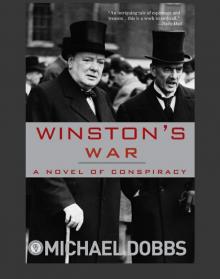 Winston's War
Winston's War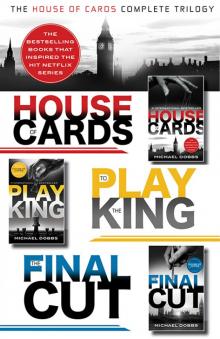 The House of Cards Complete Trilogy
The House of Cards Complete Trilogy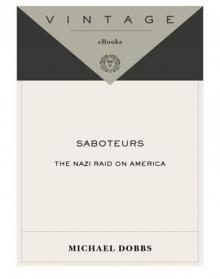 Saboteurs
Saboteurs The Touch of Innocents
The Touch of Innocents WC02 - Never Surrender
WC02 - Never Surrender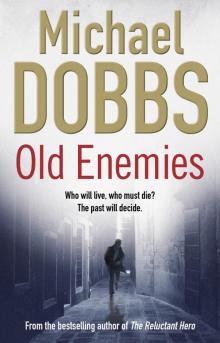 Old Enemies
Old Enemies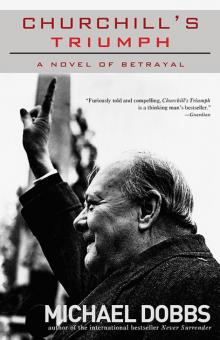 Churchill's Triumph
Churchill's Triumph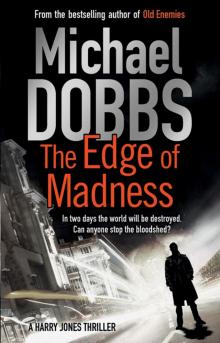 The Edge of Madness
The Edge of Madness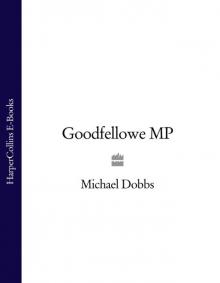 Goodfellowe MP
Goodfellowe MP The Final Cut
The Final Cut Whispers of Betrayal
Whispers of Betrayal Churchill's Hour
Churchill's Hour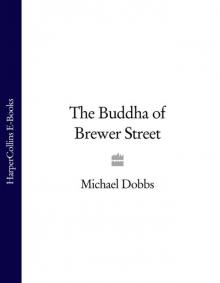 The Buddha of Brewer Street
The Buddha of Brewer Street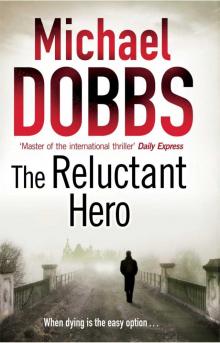 The Reluctant Hero
The Reluctant Hero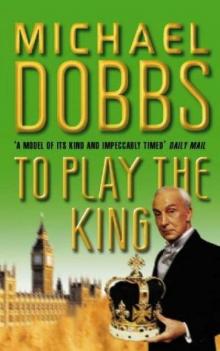 To Play the King
To Play the King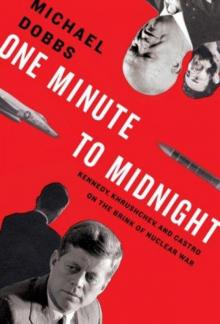 One minute to midnight
One minute to midnight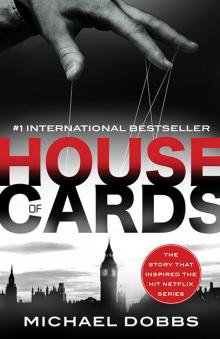 House of Cards
House of Cards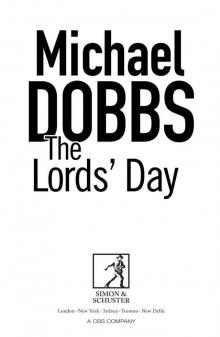 The Lords' Day (retail)
The Lords' Day (retail)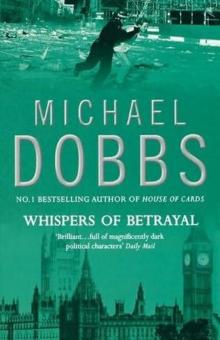 Whispers of betrayal tg-3
Whispers of betrayal tg-3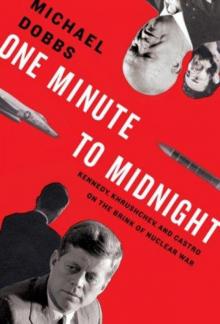 One minute to midnight: Kennedy, Khrushchev, and Castro on the brink of nuclear war
One minute to midnight: Kennedy, Khrushchev, and Castro on the brink of nuclear war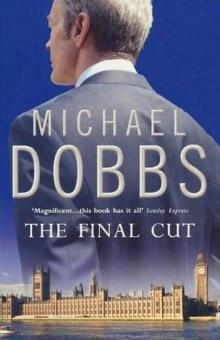 The Final Cut fu-3
The Final Cut fu-3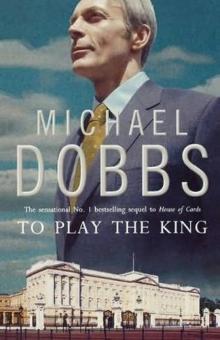 To play the king fu-2
To play the king fu-2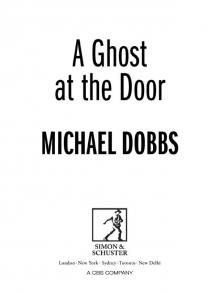 A Ghost at the Door
A Ghost at the Door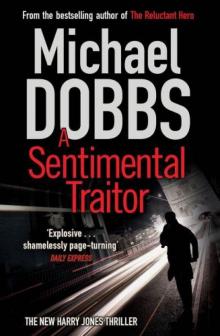 A Sentimental Traitor
A Sentimental Traitor